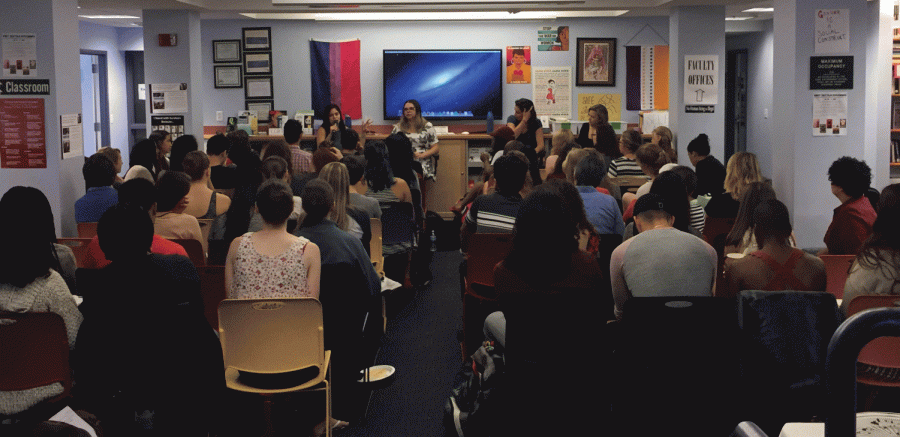Colgate Women Reflect on Gender, Race and Ethics Abroad
On Tuesday, September 20, students, faculty, staff and community members gathered in the Center for Women’s Studies (WMST) for a brown bag panel titled “Unpacking the Feminist Ethics of Study Abroad.” At the brown bag, seniors Romelia Loaiza, Natalie Krause, Grace Western and Martha Montufar discussed their time studying abroad, with special attention to the issues they experienced in relation to feminism, race, ethnicity and gender.
Krause, a women’s studies concentrator, participated in the Colgate study group in Santa Fe, NM. Krause informed the audience that she enjoyed her semester in Santa Fe, but said she was surprised and challenged by her role as a student studying abroad.
Over the course of the semester, Krause realized that the land that the residents of Santa Fe occupied was not always inhabited by the Westernized, American population that lives there now. She felt a strong need to address the history of territorial and cultural colonialism that had occurred, and still occurs, on New Mexican land that has been occupied by Native Pueblo peoples for hundreds of years.
“Sometimes you have to be concerned with your purpose and function of being abroad and being in someone else’s space,” Krause said.
A component of Krause’s program was a service-learning internship as a kindergarten and first grade teacher at the local school, where the majority of students were Pueblo. Her experience in the classroom led her to become more interested in educational studies. She assured the audience that working with Pueblo children was an incredibly rewarding experience.
Western, a political science and women’s studies concentrator, spent her semester abroad in Cameroon. While living and studying in Cameroon, Western participated in a homestay, during which she was adopted by a local family and lived in their home. Like Krause, Western found it important to question her function and purpose in a country where white people are the minority and whose culture viewed women in a drastically different way. She found it difficult to recognize the fact that her whiteness and her anthropological interests in the local people had negative implications and could be viewed as a tendency towards exoticizing Cameroonian people.
“I had to ask myself ‘What does my body represent? Is this ethical to be a white woman in Cameroon?’” Western said.
Western informed the audience that she was respected by her host family and loved her experience overall. She did, however, indicate that she witnessed instances of misogyny and female objectification while in Cameroon.
“When I would be just walking down the street, I was harassed and grabbed a lot,” Western said.
Despite a few unpleasant experiences, Western enjoyed learning about Cameroonian culture and social norms. She learned a lot about the Cameroonian norm of yelling as a sign of affection. She also undertook duties like preparing food, through which she learned about the Cameroonian way of life.
Loaiza, also a women’s studies concentrator, spent her semester abroad in Amsterdam, Netherlands. Loiaza discussed the ways in which the notion that the Netherlands is a country that is radically socially liberal may be misleading.
Same-sex marriage was legalized in 2001, Loaiza stated that issues related to sex work and religious divides remain in the Netherlands. She was shocked by this, but admitted that she has seen the same thing happen in the United States.
“While riding public transportation around Amsterdam, it was clear that the conductors committed acts of blatant racism towards Muslim women in hijabs,” Loaiza said.
Loaiza then discussed legislation that prevents two sex workers from living together, since that living space would technically be considered a brothel. Loaiza argued that this law is dangerous for sex workers, as sex workers who live alone are at a higher risk for violence at the hands of an angry or intoxicated client.
Montufar, a women’s studies concentrator, spent her semester abroad in Australia. Montufar, growing up in the Bronx, NY, stated that she came from a community that was very diverse. Upon her arrival in Australia, she was surprised by the racial homogeneity that was evident in her
new environment.
“I feel like it was a very white community, and everyone was really friendly, which kind of threw me off,” Montufar said.
Montufar provided that at most events and gatherings in Australia, the event coordinator or professor would take a moment to recognize the native peoples who originally occupied the land that they were on. She was bothered,
however, by the fact that there were not many native people left, as far as she could see. Montufar found this deeply troubling and believed that the continued marginalization of minority groups was wholly unethical.
“If we feel like we should recognize Native peoples, we can’t keep colonizing them,” Montufar said.
This brown bag, like most other events orchestrated by the WMST was well attended by faculty, students, staff and residents of Hamilton. Senior Piper McCabe was pleasantly surprised by this astonishing show of support.
“The turnout was great,” McCabe said. “There was nowhere to sit.”
Brown bags are held every Tuesday at WMST at 11:30 a.m.




